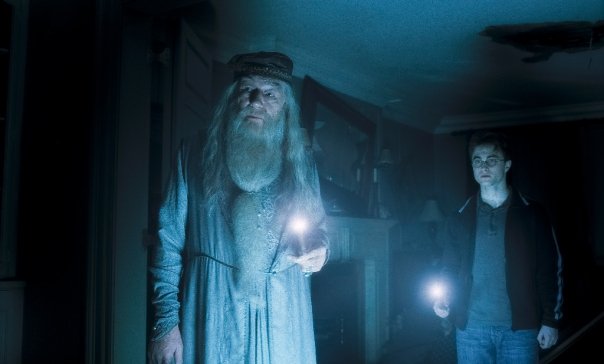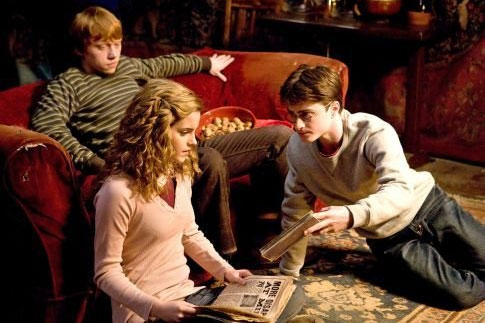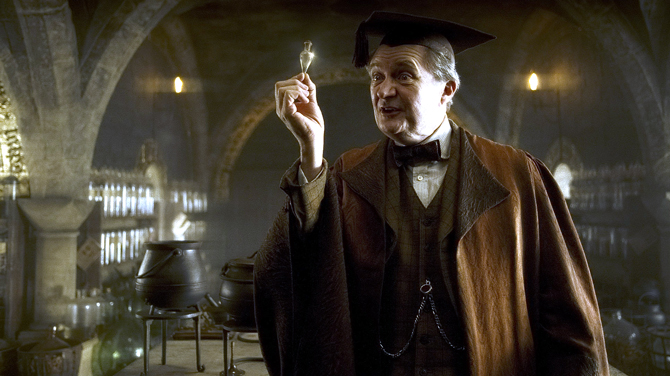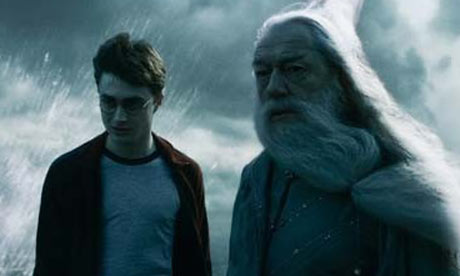Harry Potter and the Half-Blood Prince (2009)
DIRECTOR: David Yates
CAST:
Daniel Radcliffe, Rupert Grint, Emma Watson, Michael Gambon, Alan Rickman,Jim Broadbent, Tom Felton, Bonnie Wright, Maggie Smith, Robbie Coltrane, Jessie Cave, Evanna Lynch, Helena Bonham Carter, David Thewlis, Helen McCrory, Dave Legeno, Timothy Spall, Warwick Davis
REVIEW:
Following in the wake of Harry Potter and the Order of the Phoenix , which elevated the series to another level, Harry Potter and the Half-Blood Prince has managed the impressive feat of ascending another notch higher. This is a formidable contender within the fantasy adventure genre; while Order of the Phoenix’s faster, somewhat more action-oriented pace was a welcome change after the sluggish Harry Potter and the Goblet of Fire , Half-Blood Prince takes the time to settle down and remember that the friendship between Harry, Ron, and Hermione is the core of the story. Deliberately-paced but only rarely slipping into the sluggishness that is a flaw, in greater or lesser degrees, of almost all Potter installments, this film succeeds at being many things: humorous, dark, emotional, and occasionally gripping. Half-Blood Prince earns the admirably well-balanced distinction of being both the funniest Harry Potter movie (and almost all of the humor is both intentional and effective, something that wasn’t always true before), and at certain points both the creepiest and the most emotionally affecting; all eyes will not be dry by the end. Don’t worry about it returning to the PG rating after the PG-13 Goblet and Phoenix. The movie is not recommended for very small children, and the tone is the most grown-up of any Potter installment thus far. In fact, to watch Sorcerer’s Stone or Chamber of Secrets , and then Half-Blood Prince can make it a little hard to believe they all belong to the same film series.
 The threat of Voldemort and his Death Eaters is looming larger than ever, and Harry Potter’s (Daniel Radcliffe) summer is cut short by a visit from Albus Dumbledore (Michael Gambon), who recruits his help in convincing a former teacher, Horace Slughorn (Jim Broadbent) to return to Hogwarts. It seems Slughorn once taught the boy who would be Voldemort, Tom Riddle, and has some information that Dumbledore and Harry need. But upon return to Hogwarts, the problems of the increasingly menacing outside world have to compete with a universal teen problem: raging hormones. Hermione’s feelings for Ron grow more obvious, although Ron remains oblivious and enters what seems a perpetual makeout session with the smothering Lavender Brown (Jessie Cave), while Harry discovers mutual feelings between he and Ron’s sister Ginny (Bonnie Wright). Meanwhile, Harry scores high in Slughorn’s potions class with the help of an old potions book whose former owner called himself only The Half-Blood Prince, Draco Malfoy (Tom Felton) has been assigned a secretive mission by Voldemort, and Severus Snape (Alan Rickman) may finally reveal his true loyalties.
The threat of Voldemort and his Death Eaters is looming larger than ever, and Harry Potter’s (Daniel Radcliffe) summer is cut short by a visit from Albus Dumbledore (Michael Gambon), who recruits his help in convincing a former teacher, Horace Slughorn (Jim Broadbent) to return to Hogwarts. It seems Slughorn once taught the boy who would be Voldemort, Tom Riddle, and has some information that Dumbledore and Harry need. But upon return to Hogwarts, the problems of the increasingly menacing outside world have to compete with a universal teen problem: raging hormones. Hermione’s feelings for Ron grow more obvious, although Ron remains oblivious and enters what seems a perpetual makeout session with the smothering Lavender Brown (Jessie Cave), while Harry discovers mutual feelings between he and Ron’s sister Ginny (Bonnie Wright). Meanwhile, Harry scores high in Slughorn’s potions class with the help of an old potions book whose former owner called himself only The Half-Blood Prince, Draco Malfoy (Tom Felton) has been assigned a secretive mission by Voldemort, and Severus Snape (Alan Rickman) may finally reveal his true loyalties.
 While Order of the Phoenix whisked things along at a comparatively fast-moving pace, it sacrificed a lot of the little Harry-Ron-Hermione character moments along the way, and it isn’t until Half-Blood Prince that we realize how missed they were. Daniel Radcliffe became a noticeably more polished actor from Goblet of Fire to Order of the Phoenix, while the latter didn’t give Rupert Grint or Emma Watson much to do, but here, whether it is because of long experience playing the roles, growing maturity, or the direction of David Yates, the leading trio is on the most uniformly solid ground they have reached in the series. Unlike before, there are virtually no awkward or cringe-worthy moments among the three of them. Radcliffe seems equally comfortable in both serious and lightly humorous moments, while Grint gets to hone his comedic skills and Watson gives her most solid outing as Hermione. Also fully coming into his own is Michael Gambon as Dumbledore. I had issues with Gambon in Prisoner of Azkaban and especially in Goblet of Fire, thought he was improved in Order of the Phoenix but still was not completely sold on his portrayal, but Half-Blood Prince is by far Dumbledore’s (and Gambon’s) biggest chance to shine, and I am happy to report that Gambon rose fully to the occasion and finally, completely nails Dumbledore. In the past gruff and commanding but too harsh and unapproachable, Gambon’s Dumbledore finally makes an emotional connection, which is crucial. We finally see the warm, mischievous twinkle in his eye, sense his dignity and wisdom, and feel his care for Harry. When told before that Gambon’s Dumbledore cares about Harry, the words felt hollow and left us unconvinced, something we’d been told but not shown. Here, when it’s said, we believe it. If anyone deserves acting accolades for Half-Blood, it is Gambon- something I wouldn’t have been sure about saying based on his previous outings, but which I am very happy to be able to say.
While Order of the Phoenix whisked things along at a comparatively fast-moving pace, it sacrificed a lot of the little Harry-Ron-Hermione character moments along the way, and it isn’t until Half-Blood Prince that we realize how missed they were. Daniel Radcliffe became a noticeably more polished actor from Goblet of Fire to Order of the Phoenix, while the latter didn’t give Rupert Grint or Emma Watson much to do, but here, whether it is because of long experience playing the roles, growing maturity, or the direction of David Yates, the leading trio is on the most uniformly solid ground they have reached in the series. Unlike before, there are virtually no awkward or cringe-worthy moments among the three of them. Radcliffe seems equally comfortable in both serious and lightly humorous moments, while Grint gets to hone his comedic skills and Watson gives her most solid outing as Hermione. Also fully coming into his own is Michael Gambon as Dumbledore. I had issues with Gambon in Prisoner of Azkaban and especially in Goblet of Fire, thought he was improved in Order of the Phoenix but still was not completely sold on his portrayal, but Half-Blood Prince is by far Dumbledore’s (and Gambon’s) biggest chance to shine, and I am happy to report that Gambon rose fully to the occasion and finally, completely nails Dumbledore. In the past gruff and commanding but too harsh and unapproachable, Gambon’s Dumbledore finally makes an emotional connection, which is crucial. We finally see the warm, mischievous twinkle in his eye, sense his dignity and wisdom, and feel his care for Harry. When told before that Gambon’s Dumbledore cares about Harry, the words felt hollow and left us unconvinced, something we’d been told but not shown. Here, when it’s said, we believe it. If anyone deserves acting accolades for Half-Blood, it is Gambon- something I wouldn’t have been sure about saying based on his previous outings, but which I am very happy to be able to say.
Alan Rickman is as dry, sneering, and foreboding as ever, but there is a hint of a greater depth and layers of moral dubiousness and conflict than we have seen before. No longer just the deliciously sneering foil for Harry among the Hogwarts staff, Snape comes to true prominence here as a figure of unsettling ambiguity. Tom Felton, who has had nothing to do beyond a couple minutes of obligatory sneering at Harry per episode thus far, has a significantly expanded role, and brings out some of the vulnerability and conflict behind the sneer, allowing us for the first time to see Draco as a little more of a three-dimensional character than the one-note bullying brat. In fact, it could be argued that Draco is the most conflicted and tormented character in the movie. Bonnie Wright, whose Ginny has hovered around the periphery for five installments, finally also gets a little time in the sun as a budding romance develops between she and Harry. Evanna Lynch returns as the daffy Luna Lovegood, but Neville Longbottom (Matthew Lewis), who got a little more to do than usual in the last installment, is sent back to the background here.
 The rest of the faculty, including McGonagall (Maggie Smith) and Hagrid (Robbie Coltrane) don’t get a lot to do, although Flitwick (Warwick Davis) gets a couple more lines than usual, Lupin (David Thewlis) Tonks (Natalia Tena), and all of the Weasleys beyond Ron and Ginny get walk-on roles, and Timothy Spall’s appearance consists of opening and closing a door (his makeup probably took longer than filming his scenes). Ralph Fiennes’ serpentine adult Voldemort is kept offscreen this time around, although two younger incarnations appear in preserved memories: first his nephew, Hero Fiennes-Tiffin, as the adolescent Tom Riddle, and later Frank Dillane (replacing Chamber of Secrets’ Christian Coulson, who was deemed too old to reprise the role) as the teenage Riddle. Both, particularly Dillane, radiate eerily calm and collected demeanors with an underlying creepiness (also, while there’s no noticeable resemblance between Hero Fiennes-Tiffin and his more famous uncle, Frank Dillane vaguely resembles both of them, enough to convincingly string them all together as the same person; he looks more like the adult Voldemort than Christian Coulson, but of course Coulson was cast before they had decided on an actor for the older Voldemort). Also in the bad guy contingent are Helena Bonham Carter, getting to run around acting gleefully insane in a couple scenes scattered around, and Helen McCrory as Draco’s mother Narcissa, who is both sinister and fragile in her bit opening part. Jessie Cave as Lavender Brown is a little annoying, overdoing the obsessively clinging girlfriend shtick a little, but it’s hard to say whether that’s more Cave’s fault or the way her scenes were written or directed. The most prominent new face is Jim Broadbent as Slughorn, who projects a demeanor of a befuddled, doddering, self-serving professor who collects prominent or famous students around himself like honey drawing flies, but while Broadbent mainly serves as comic relief, with his flustered manner and bug-eyed expressions (Broadbent is reminiscent of the late Denholm Elliott), he also carries a dark secret and long-buried guilt, and Broadbent keeps more serious undertones bubbling beneath the surface without overdoing it.
The rest of the faculty, including McGonagall (Maggie Smith) and Hagrid (Robbie Coltrane) don’t get a lot to do, although Flitwick (Warwick Davis) gets a couple more lines than usual, Lupin (David Thewlis) Tonks (Natalia Tena), and all of the Weasleys beyond Ron and Ginny get walk-on roles, and Timothy Spall’s appearance consists of opening and closing a door (his makeup probably took longer than filming his scenes). Ralph Fiennes’ serpentine adult Voldemort is kept offscreen this time around, although two younger incarnations appear in preserved memories: first his nephew, Hero Fiennes-Tiffin, as the adolescent Tom Riddle, and later Frank Dillane (replacing Chamber of Secrets’ Christian Coulson, who was deemed too old to reprise the role) as the teenage Riddle. Both, particularly Dillane, radiate eerily calm and collected demeanors with an underlying creepiness (also, while there’s no noticeable resemblance between Hero Fiennes-Tiffin and his more famous uncle, Frank Dillane vaguely resembles both of them, enough to convincingly string them all together as the same person; he looks more like the adult Voldemort than Christian Coulson, but of course Coulson was cast before they had decided on an actor for the older Voldemort). Also in the bad guy contingent are Helena Bonham Carter, getting to run around acting gleefully insane in a couple scenes scattered around, and Helen McCrory as Draco’s mother Narcissa, who is both sinister and fragile in her bit opening part. Jessie Cave as Lavender Brown is a little annoying, overdoing the obsessively clinging girlfriend shtick a little, but it’s hard to say whether that’s more Cave’s fault or the way her scenes were written or directed. The most prominent new face is Jim Broadbent as Slughorn, who projects a demeanor of a befuddled, doddering, self-serving professor who collects prominent or famous students around himself like honey drawing flies, but while Broadbent mainly serves as comic relief, with his flustered manner and bug-eyed expressions (Broadbent is reminiscent of the late Denholm Elliott), he also carries a dark secret and long-buried guilt, and Broadbent keeps more serious undertones bubbling beneath the surface without overdoing it.
 One thing that elevates Half-Blood is how much more grown-up and effective the character-driven humor is than in Goblet of Fire or even Prisoner of Azkaban. Large chunks of the movie feel like a fairly typical teenage romantic comedy, and the changing dynamics of the relationships between Harry, Ron, and Hermione (and especially Ron and Hermione and Harry and Ginny) are given significant attention. The close bonds are still in place, but as they age, the way they relate to and feel about each other are growing and changing. There’s even a few moments of obviously intentional innuendo; the filmmakers aren’t afraid to acknowledge that, after all, these are teenagers, and hint that they might have more than snogging on the brain. In fact, character interaction and character-driven humor is paid much more attention than the sometimes interminable screen time devoted to learning of spells that made some non-fans of the books previously feel a little alienated. Half-Blood Prince wastes no time on frivolous- and often juvenile- bits of magic we’ve seen a million times before: the ghosts roaming the halls, the moving staircases and moving portraits. When magic happens here, it has weight and power, most impressively when Dumbledore conjures a whirlwind of fire to defend Harry and a scene that brings to mind Moses parting the Red Sea in a probably not coincidental visual nod. Ralph Fiennes’ Voldemort kept behind the scenes leaves a sizable gap in the central menace, but there are a few moments here that are too disturbing for very young viewers, including a curse/possession scene that wouldn’t be too out-of-place in The Exorcist, a character laying spread-eagled in the water with blood seeping through his shirt and into the water around him, a tense chase in which Death Eaters toy with Harry and Ginny in a wheat field, and most frighteningly, Harry and Dumbledore menaced in an ominous cave by the Inferi- reanimated emaciated corpses left behind as guardians of one of Voldemort’s secrets (the scene in which they first pop up made several audience members jump in my theater). I have my doubts about whether the Inferi’s emaciated, hollow-eyed appearances deliberately brought to mind Holocaust victims, but the visual resemblance, intended or not, adds another disturbing level to their emergence. For those who have read the book, be assured that the climactic event, while not necessarily 100% identical to its written version, is handled with dignity and appropriate weight, and tears will flow. It also leaves the ending feeling more uncertain than ever, as Harry and his friends are suddenly cut adrift, without the character who had served as an anchor and reassuringly constant, reliable presence for six books’ and movies’ worth of their adventures.
One thing that elevates Half-Blood is how much more grown-up and effective the character-driven humor is than in Goblet of Fire or even Prisoner of Azkaban. Large chunks of the movie feel like a fairly typical teenage romantic comedy, and the changing dynamics of the relationships between Harry, Ron, and Hermione (and especially Ron and Hermione and Harry and Ginny) are given significant attention. The close bonds are still in place, but as they age, the way they relate to and feel about each other are growing and changing. There’s even a few moments of obviously intentional innuendo; the filmmakers aren’t afraid to acknowledge that, after all, these are teenagers, and hint that they might have more than snogging on the brain. In fact, character interaction and character-driven humor is paid much more attention than the sometimes interminable screen time devoted to learning of spells that made some non-fans of the books previously feel a little alienated. Half-Blood Prince wastes no time on frivolous- and often juvenile- bits of magic we’ve seen a million times before: the ghosts roaming the halls, the moving staircases and moving portraits. When magic happens here, it has weight and power, most impressively when Dumbledore conjures a whirlwind of fire to defend Harry and a scene that brings to mind Moses parting the Red Sea in a probably not coincidental visual nod. Ralph Fiennes’ Voldemort kept behind the scenes leaves a sizable gap in the central menace, but there are a few moments here that are too disturbing for very young viewers, including a curse/possession scene that wouldn’t be too out-of-place in The Exorcist, a character laying spread-eagled in the water with blood seeping through his shirt and into the water around him, a tense chase in which Death Eaters toy with Harry and Ginny in a wheat field, and most frighteningly, Harry and Dumbledore menaced in an ominous cave by the Inferi- reanimated emaciated corpses left behind as guardians of one of Voldemort’s secrets (the scene in which they first pop up made several audience members jump in my theater). I have my doubts about whether the Inferi’s emaciated, hollow-eyed appearances deliberately brought to mind Holocaust victims, but the visual resemblance, intended or not, adds another disturbing level to their emergence. For those who have read the book, be assured that the climactic event, while not necessarily 100% identical to its written version, is handled with dignity and appropriate weight, and tears will flow. It also leaves the ending feeling more uncertain than ever, as Harry and his friends are suddenly cut adrift, without the character who had served as an anchor and reassuringly constant, reliable presence for six books’ and movies’ worth of their adventures.
There are only a few fairly minor missteps that screenwriter Steve Kloves makes in the translation from book to screen. Some complain about the reduction of the books’ more substantial Tom Riddle flashbacks to only two scenes, but the most essential information is, in my opinion, efficiently relayed. More problematic, in my opinion, is the short shrift given to the identity of the Half-Blood Prince; for being the title of the movie, the final revelation is treated as an afterthought of no particular significance, and no explanation is made of why he chose that name for himself.
But these are minor quibbles. Harry Potter and the Half-Blood Prince is the best installment of the series so far, funny in a more effective and natural way than before, with more emotional depth than before, and the feeling of encroaching ominous menace continues to permeate, enhanced by cinematographer Bruno Delbonnel’s brown-hued, at times almost desaturated tones. All around, this is the most solid in every aspect film to yet bear the name of Harry Potter, and bodes promisingly for Yates’ final turns in the director’s chair, Harry Potter and the Deathly Hallows parts 1 & 2.
***1/2